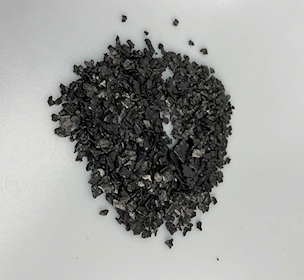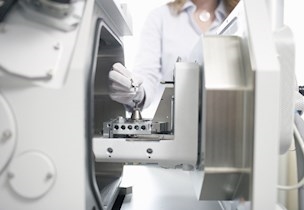Test and analysis of plastics and composites
Assistance with polymers and composites in order to ensure optimal material selection and design.
Plastics and composites, including rubbers, polymers and coatings, are being increasingly used in industrial products. The advantages of these materials are many, however it is important that you choose the best material that meets the requirements for your product or your component.
Material selection and design of plastic and composite components
We provide guidance with material selection, design, and preparation of specifications for all polymer and composite materials; for new designs as well as optimization of existing products. We ensure that the product meets your requirements as well as the needs of your customer regarding:
- Functionality
- Quality
- Adhesion and joining
- Material composition
- Current statutory environmental requirements
- Documentation
Our polymer and composite specialists cover all materials within plastics and composites. We can assist you defining the function and determining the applicability of various materials in different environments and situations of use.
We also test resistance to weather and light stability of materials under various conditions, and we have expertise in how elements such as light, moisture and chemicals may influence the durability and service life of your product.
We can test the strength of joints and adhesions, e.g. welds and bond lines, and determine whether composites will meet your requirements. We can also determine the adhesion of a protective paint or coating, and perform accredited measurements of surface tension on solid as well as liquid substances, as well as sell you fluids for surface tension measurements.
Consultancy to ensure your products meet the requirements
We provide consultancy in connection with production and purchase of products and raw materials, which ensures that you and/or your supplier will meet the current statutory documentation requirements.
Our expertise also includes material selection, chemical analysis of fillers and other additives, migration analysis, thermal analysis to determine the glass transition temperature and composition, phthalate analysis and degree of crosslinking. We also provide assistance to help substitute dangerous substances with more healthy or environmentally friendly alternatives.
Damage and failure analyses
As a producer or end user of plastic products or components, it is important that the durability and service life meet the expectations and requirements so that high cost failures, production shut downs or even accidents can be avoided.
Damage and failures in plastics/polymers, composites or rubbers, typically occur due to structural overloading or exposure to environments that degrade the material properties. The cause of failure may also be due to the design of the component, a production defect or the incorrect selection of material.
Examples of typical damage would be a destroyed rubber gasket, laminate delamination, bond line cracking, surface contamination and discoloration. These types of damage are often caused by the material properties not matching the design requirements and operating conditions, e.g. too low density or strength compared to load.
In cases where damage has occurred and the material is cracked or deformed, we can test and analyse the material in order to find the reason for the failure. We also provide advice regarding the improvement of materials properties in order to avoid future failures.
Verification and documentation
We can verify and provide detailed documentation in relation to damage and failures, so that you have an official report describing the damage that occurred as well as the most probable cause of the failure, which can be communicated to your customers and suppliers, as well as authorisation bodies and other interested parties.
As a manufacturer or supplier of products or components, it is necessary to meet the level of quality required by your customers. Therefore, it may be of value that you are able to document why the damage to your product occurred and to make design/production changes in order to adapt the product to the needs of the customer.
If you are the end user of a product or component, we are also able to verify and prepare documentation in connection with damage and failures in order for you to communicate to your suppliers, how the failure occurred.
Test and analysis
In relation to material selection, damage and failures we apply a number of advanced analysis methods and measuring techniques in order to test and document the product or component. For each case, we agree with the customer which combination of tests (both standard and non-standard) is necessary. Our tests and analyses include:
- Moisture content and absorption
- Surface tension
- Diffusion, permeation and migration
- Element determination
- ESC- Environmental Stress Cracking
- Swelling of rubber
- Rubber compression set
- Fourier Transform Infrared Spectroscopy (FTIR) and FTIR-microscopy
- Scanning Electron Microscopy (E-SEM and FIB-SEM)
- Advanced 3D surface characterisation
- Density and viscosity determination
- Thermal analysis, DSC (Differential Scanning Calorimetry) and TGA (Thermo gravimetric analysis)
- Weather condition test (accelerated ageing) in climate chamber (UV, Weather-o-Meter)
- Molecule weight determination and distribution (GPC – Gel Permeation Chromatography)
- Mechanical testing
- Hansen Solubility Parameters (HSP)
- Fibre and void content
- Finite Element (FE) analysis and reverse engineering
Research, development and demonstration
FORCE Technology collaborates with companies, universities and authorities on research and development projects. We have participated in a number of projects in order to advance the development of polymer and composite materials.
Our commitment to research, development and demonstration means that our employees have up-to-date knowledge and practical ‘know how’ that will benefit our customers. We participate in projects relating to:
- Recycling of composites for new innovative applications
- Resource optimisation in connection with reuse of polymer
- Design, materials selection, manufacturing and quality assurance of composites
- Characterisation of micro- and nanostructured surfaces
- Application of composites offshore
- Degradation of polymers
- Bio-plastics and bio-composites
- Damage and failure and failure analysis of polymers and composites






